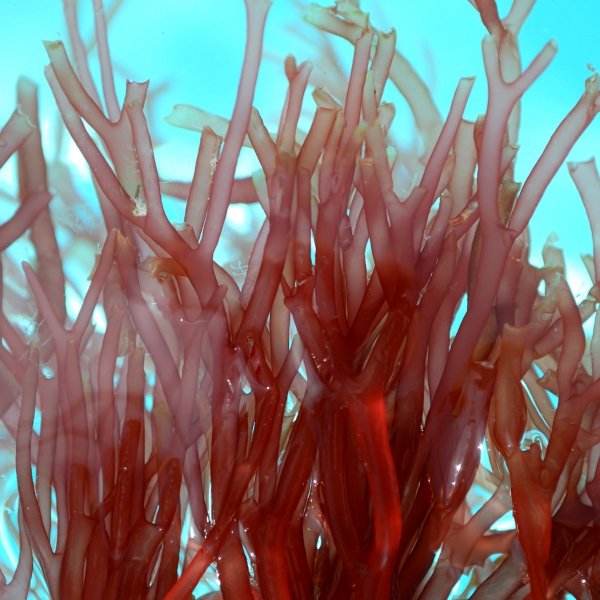Sea Botanicals in Skin Healing: Seamoss and Astaxanthin
Seamoss and Astaxanthin are sea botanicals found naturally in the ocean. They are two highly effective skincare ingredients that address dry skin and oxidative stress, the root of many skin ailments. I use these ingredients in my acne treatment plan and recommend them to clients.
Sea plants have a high concentration of vitamins, minerals, amino acids, and antioxidants that are essential to skin radiance. They can be used in treatments targeting sensitive skin, inflammatory skin conditions, acne, and aging.
Seamoss and microalgae are abundant species and are considered sustainable plants. Sea mosses, grasses, weeds, and microalgae are used in all sorts of commercial industries because they are high in valuable compounds for food, medicine, etc.
Recently seaweed and its relatives are becoming hugely popular in beauty and wellness. While there are tons of beneficial sea-faring plant species, let’s dig into what Seamoss and Astaxanthin do for our skin!
What is Seamoss?
Seamoss, also known as Irish moss, is a species called Chondrus crispus. This red algae has many benefits for overall wellness and is an excellent sustainable and vegan ingredient for the skin!
Seamoss is known for being high in vitamins, minerals, antioxidants. Seamoss is naturally anti-inflammatory and may even be antibacterial (3). It is a powerful humectant; it pulls water to your skin surface from the environment. This action prevents water from being drawn from the deeper layers of your skin. The result is plump, hydrated skin. Essentially, it’s a powerhouse of soothing properties that really contribute to overall skin healing.
Seamoss is used internally and topically. It is typically added to vegan foods or taken as a drink. We recommend using Seamoss in a mask or an overnight treatment. Seamoss leaves a thin protective film over the skin that nourishes over time.
It is super easy to D.I.Y. a seamoss mask or you use products that contain sea moss. You can use Seamoss as often as you would like, and it is okay for all skin types, especially sensitive skin!
What are the benefits?
Hydrates skin
Reduces fine lines
Helps clarify pores
Helps with discoloration
What is Astaxanthin?
Astaxanthin (a·stuh·zan·thn) is a compound produced by microalgae when the plant is under environmental stress (1).
Astaxanthin is found in several species but is most commonly extracted from Haematococcus pluvialis, Chlorella zofingiensis, Chlorococcum, and Phaffia rhodozyma.
Astaxanthin is an antioxidant in the family of Carotenoids. It’s found in foods with a natural red hue like shrimp and salmon. As one of the most powerful antioxidants found in nature, it is highly effective at fighting free radicals and is. Astaxanthin is over 50% more effective than vitamin C and beta-carotene.
Astaxanthin has all of the qualities that support skin health. It is known to improve barrier function, which is essential to healing and improving nearly all skin conditions (2). Astaxanthin is perfect for sun worshippers as it is shown to protect against UV-induced damage and heal previous damage
What are the benefits?
Powerful antioxidant
Anti-inflammatory
Works well with sensitive skin
Improves hyperpigmentation and acne
Promotes firm and hydrated skin
Vegan and sustainably sourced
How are Astaxanthin and Seamoss sustainable?
Sea botanicals are typically highly sustainable. These plants grow quickly so they recover well from wild harvesting. They are also easy to farm, which creates eco-friendly jobs!
Want to learn how to incorporate these ingredients into your skin regimen? If you have any questions about your personal skin routine, you can always reach out to us, we would love to help you!
And, as a disclaimer for your safety: Any supplement can have contraindication and/or cause reactions so we recommend that you always speak to your doctor if you are considering an internal supplement. For topical treatments, always do a small patch test to avoid negative reactions.
Astaxanthin: Sources, Extraction, Stability, Biological Activities and Its Commercial Applications. Ranga Rao Ambati, et al. 2014. https://www.ncbi.nlm.nih.gov/pmc/articles/PMC3917265/
The Protective Role of Astaxanthin for UV-Induced Skin Deterioration in Healthy People—A Randomized, Double-Blind, Placebo-Controlled Trial. Ito, N. et al. 2018. https://www.ncbi.nlm.nih.gov/pmc/articles/PMC6073124/
In vitro activities of kappa-carrageenan isolated from red marine alga Hypnea musciformis: Antimicrobial, anticancer and neuroprotective potential. Souza et al. 2018. https://www.sciencedirect.com/science/article/pii/S0141813017343209#bb0100
